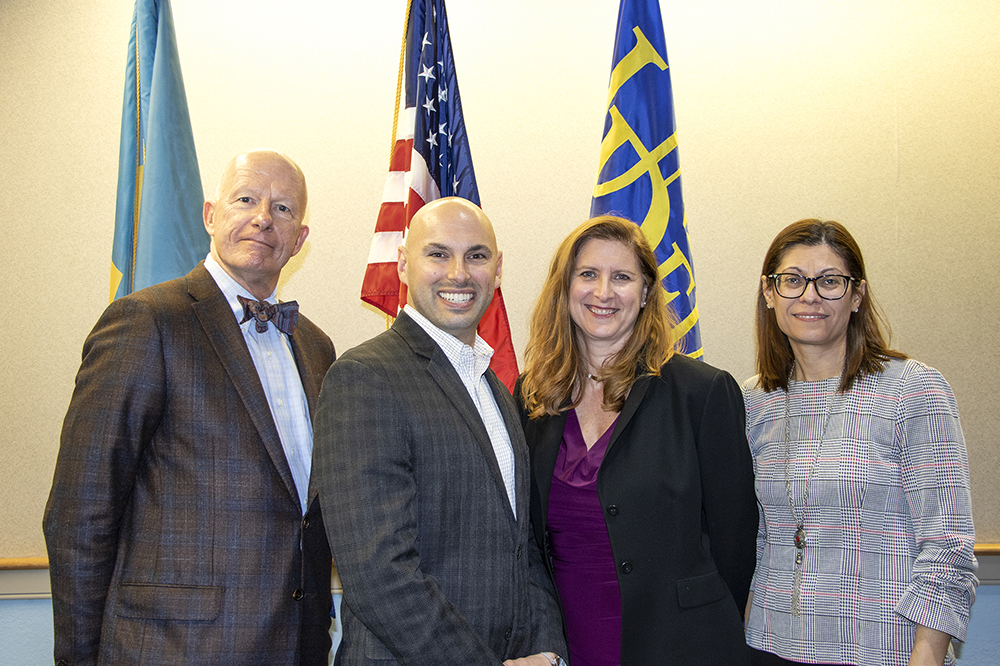Joshua Wilson Wins Mangone Young Scholar Award

The University of Delaware’s Francis Alison Society has selected Jason Gleghorn, assistant professor in the College of Engineering, and Joshua Wilson, assistant professor in the College of Education and Human Development, as the winners of the 2019 Gerard J. Mangone Young Scholars Awards.
The award recognizes promising and accomplished young faculty. Gleghorn was honored in the Engineering and Natural Sciences category, while Wilson was honored in the Social Sciences and Humanities category. The recipients are chosen by fellow faculty members who have received the Francis Alison Award, the University’s highest competitive faculty honor.
Joshua Wilson, assistant professor in the School of Education, joined the UD faculty in September 2014, and has pursued an influential line of research examining how computer-based writing evaluation software can assist in the teaching and learning of writing.
“The importance of writing will only increase as our public education system focuses more and more on higher-level critical thinking skills to address the challenges facing our competitive global society,” Wilson said. “So now the question is: what can we do to better prepare our students?”
Unlike oral communication, writing is a skill few learn naturally. Writing needs to be taught explicitly and requires years of concerted effort. Fewer than one in three students in grades 4, 8 and 12 demonstrate adequate writing ability, according to recognized educational standards, and approximately 30 percent of students will take at least one remedial course while in school.
The problem is that most students are simply not receiving enough writing instruction, spending fewer than 15 minutes each day devoted to the task, according to Wilson. Why are so many students falling behind? The biggest barrier is time. Reading and evaluating student writing is very time consuming for teachers, even more so when the purpose is to provide feedback.
“Consequently,” Wilson said, “many teachers avoid assigning extended writing projects in favor of shorter sentence or paragraph level writing assignments.”
To overcome the time barrier, Wilson is at the forefront of testing and evaluating automated writing evaluation (AWE) software that provides students immediate feedback designed to help them identify writing issues.
Not only do students who use AWE report improvements in critical thinking, problem solving and writing ability, but these improvements are associated with noticeable gains in state test performance. Moreover, gains were not restricted to one particular demographic group, and the software has been shown to help students with disabilities catch up to their peers.
AWE also helps teachers to identify struggling writers early in the school year. For example, Wilson’s research has shown that humans will need between 16 and 28 writing samples from a single student to accurately and efficiently assess writing ability. AWE requires between 3 and 6.
Wilson’s scholarly output has been extensive, especially for an assistant professor at an early stage in his career. Since 2014, Wilson has published 14 peer-reviewed articles in top-tier academic journals, along with two book chapters and five additional publications either accepted for publication or under review. Wilson has also received numerous grants to fund his innovative research agenda, including a grant of nearly $400,000 from the Institute of Education Sciences.
“The superior quality of Dr. Wilson’s work has been recognized by leaders in the field. Without a doubt, he is a rising star in the world of education and a wonderful scholar,” said Chrystalla Mouza, director of the School of Education. “He is the kind of faculty member who will go the extra mile for his colleagues and students. He was a superb addition to our faculty and should be recognized for his outstanding research which is already changing the face of writing instruction.”



